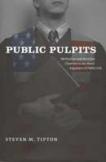For the Common Good?
In many respects, this book represents a breakthrough. First, it is the fruit of 15 years of research on the lobbying and moral-political activity of the mainline Protestant churches. It combines a treasure trove of rich interview and case study material on lobbying activities in Washington, D.C., by the United Methodist Church (through its General Board of Church and Society), the United Church of Christ, the Friends Committee on National Legislation and the National Council of Churches. In a field rife with studies about the role of the Christian right, the book represents welcome nuanced attention to mainline Protestant efforts at public moral advocacy.
Steven M. Tipton, a professor of sociology and religion at Emory University, the author of Getting Saved From the Sixties and co-author with Robert Bellah of Habits of the Heart and The Good Society, views the churches as representing the institutions that provide the single most democratic counterweight to an increasingly class-based American divide on economic, cultural and political questions. Churches are likely to intone a communal pitch (concern for the common good) to the prevalent American moral song of procedural rules, self-interest and individualism. But denominations run the serious risk of becoming internally riven into what Tipton calls “caucus churches.”
At the level of national and local congregations, opinions are divided over whether the churches should stress prophetic witness over becoming primarily “good Samaritans,” dispensing faith-based charity to the victims of economic dislocation, a church as primarily concerned with justice or charity. Should churches engage mainly in moral advocacy or get down and dirty in mobilizing voters for broad electoral causes? Should they put their chief efforts into teaching their social creeds to local congregations? Should they resist increasing isomorphic pressures to become more like para-church institutions engaged as religious lobbies?
Public Pulpits thoughtfully considers these dilemmas. Tipton presents case studies of the General Board of Church and Society of the Methodists (the third largest religious denomination in America and one that mirrors better than other mainline churches the American class divisions); Good News, a Methodist conservative renewal group that also helped spawn the notorious—some would say nefarious—Institute on Religion and Democracy, which has spent much time and money undermining the moral authority of mainline Protestant national organs; the Inter-Faith Impact for Justice and Peace (a group that risks the danger of flattening out theological differences to make possible closer coordination among mainline Protestant bodies); the Inter-Faith Alliance (a mainline Protestant effort to counteract the religious right); and the efforts of the National Council of Churches to lobby for health care reform. Along the way, Tipton probes the sometimes dubious funding sources for mainline Protestant moral advocacy—some quite neoconservative; some very liberal.
I came away from this book with a new and more healthy wariness about para-church groups. Tipton writes of such groups:
Free-standing, member based single issue religious groups more closely resemble their non-religious counterparts than they resemble churches, political parties or government itself. They are more prone to fuse absolute moral principle and particular legislative provisions. They are likelier to mobilize members to vote for or against candidates given their stance on single issues and to rise or fall on their ability to win issue-specific fights.
Again, Tipton argues:
Para-church groups across the political spectrum threaten both religious awareness and public civility when they forego the demanding integrity of religious practice and community in their strategic efforts to manage public opinion, mobilize partisan constituencies and lobby the state along the morally instrumental lines of interest-group politics.
Tipton’s case studies shed light on the continuing push for religious groups to converge toward the organizational forms of free-standing lobbies, ideological think tanks or membership-based political action committees. These, however, already crowd the American public square when what is needed, as an important corrective and counter-weight, are groups that raise up the common good and care for issues of society as a whole.
As a critic of narrow interest-balancing politics and a champion of a more vigorous sense of deliberative democracy, Tipton, in the end, plumps for an institutional model for civic life, and a public stance by churches that is more like a forum and a collegial assembly—that is, more like healthy inner church dynamics—than like a marketplace, a bureaucracy or, as he notes, “a bully pulpit.”
Public Pulpits should be read by all those in the churches, at whatever level, who are engaged in social teaching and moral advocacy. For those less interested in churches, it illuminates the kind of moral argument in public life that will best enhance our communal purposes.
This article also appeared in print, under the headline “For the Common Good?,” in the September 22, 2008, issue.








